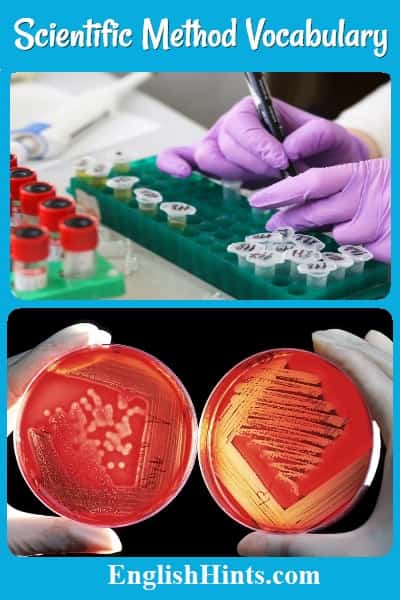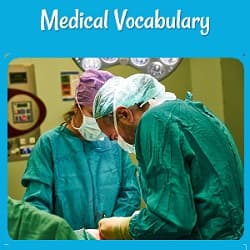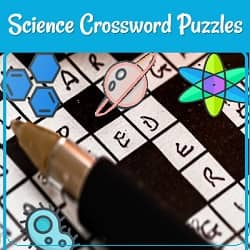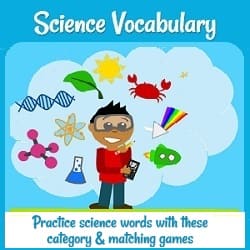Scientific
Method Vocabulary
You should learn basic scientific method vocabulary (and how the scientific method works) even if you are not a scientist.
Many academic disciplines use this vocabulary and some version of the scientific method.
(Social sciences like sociology and psychology use it, as well as sciences like biology, chemistry, and physics.) It helps researchers identify and investigate problems and find solutions.
This page gives non-technical explanations of some basic vocabulary. Then there's a short discussion of the scientific method and a matching quiz. Both let you see how the vocabulary can be used.
If you would like, you can get review these words with a similar pdf and (different) quiz. See Vocabulary Worksheets.
You can also skip the vocabulary explanations (or review them later.) These links go straight to the Scientific Method or to the vocabulary matching practice.
Scientific Method Vocabulary (with examples)
bias- an opinion or pre-judgment that could prevent an evaluation of research results from being objective.
Example: He can’t give a fair opinion of her research because he is biased against women.
data- information. (Data is plural. The singular is ‘datum.’)
Ex: Scientists analyze the data they collect from experiments to confirm or to change their hypotheses about how things work.
evaluate- to set a value on something after examining it.
Ex: “Peer review” is a process scientists use to evaluate the research of other scientists. They want to ensure it is valid before publishing it.
evidence- facts or information that can help solve a crime, show that something is true or false, or prove a point.
Ex: Although the thief wore gloves, he left behind evidence he didn’t notice. Detectives found a cigarette stub and shoe prints in a muddy spot behind the house.
factor- one of several possible influences that can affect what happens. (‘Factor’ also has a special meaning in math)
Ex: Carbon emissions are a major factor affecting climate change.
issue- a problem or topic people are concerned about. Another meaning of 'issue': one release that is part of a series of a magazine or newsletter.
Ex 1: One of the major issues in the last U.S. election was the economy.
Ex 2: This is the second issue of English Detective.
reproduce- make a copy or produce again. (When animals and plants reproduce, they produce more of the same species. Scientists reproduce an experiment when they get the same results.)
Examples: Human reproduction results in babies. Many plants reproduce through seeds.
valid- true or legally acceptable (like a valid license). Valid experimental results need to be both relevant and significant. (Relevant means related. Results must have a connection to what they are supposed to prove. Significant means results must be large enough to be meaningful. if a result is very small, it might have happened by chance.)
Ex: When someone makes an argument based on unsound
reasoning, we question the validity of his conclusions. If each part of the
argument makes sense and nothing important is overlooked, it may be a valid
argument.
variable (noun)- something that can be changed and that might affect or change your results
Ex: In a valid experiment, only the tested variable should change.
In mathematics, a variable is a symbol in an equation that may represent various numbers.
variable (adjective)- changeable
Ex: Spring temperatures are often quite variable. They sometimes change from quite cold to hot in a few hours.
to vary is to be slightly (a little bit) different:
Ex: "The results of the second bean-planting experiment varied from those of the first. Hotter temperatures caused the second group of beans to grow faster."
various (adjective)- several or different
Ex: The lab is working on several projects at once. Two are almost finished. The rest are going through various stages of planning and testing.
version- a different form or variety of something, like a different edition of a book
Ex: the latest version of the TOEFL exam
The Scientific Method

Scientists care about understanding the world. They want to observe nature and explain how and why things work the way they do.
One way scientists learn more about nature is by conducting experiments. They make a hypothesis. (That's an explanation of what they think will happen when they make a certain change.)
Then they make that change-- in one variable at a time-- to see what will happen. They evaluate the results of their experiment. Does the evidence they found support the hypothesis? As they learn more, they make new hypotheses. They find clearer and better explanations of what has happened.
Various versions of the scientific method list four to seven+ steps. Numbering the steps a certain way is not important. Instead, ask if the process considered all the evidence. Did it produce results that answered the original question or solved the problem?
Here are the main steps in the process:
1. Identify a problem that you want to solve. (You could also ask a question about something that doesn’t make sense or that you want to understand better.)
2. Do some research to find out what other people have already tried and learned.
3. Make a hypothesis-- a guess about how to explain what you have noticed and to answer your question.
4. Design experiments to test your hypothesis and determine if it is true. Be sure to think about all the things that could affect your results, and change only one variable at a time. (You want to know what is causing the outcome you get. You also want to be sure your results are not accidental or caused by some condition you had not considered.)
To make sure an experiment gives valid results you need controls. Controls are situations like the test except for the single variable you change. (They make it clear whether what you predicted would cause a change was the actual cause.)
You also need to prevent bias from having any effect. Make sure your hopes or expectations do not influence or change the results.
The most valid scientific experiments are “double-blind” tests. (These are the kind governments require to prove that a new medicine is safe and effective. They want to be sure it does what it’s supposed to do.)
In double-blind drug experiments, no one knows who is receiving the new drug and who is getting a placebo. (A placebo is a pill that looks the same but has no active ingredients.) Neither the researchers nor the participants find out until after the experiment.
This is a way to prevent any researcher bias from affecting the results. (It also limits the effect of participant expectations. No one knows if they are getting the actual medicine.)
5. Make accurate (careful and exact) observations, and keep accurate records.
6. Evaluate your results. (Look them over and decide if they are clear and valid.) Change or repeat the experiment if necessary.
7. Analyze your data. Interpret your results for their implications. What do they mean? what do they suggest about similar situations? What conclusions can you reach?
Report your experiments, results, and conclusions. It's important to share them so others can use what you have learned. (Others may also repeat the experiments to check the results.)
If they cannot reproduce your results when they repeat it, the results may not be valid.
(If they followed your exact procedure, there is a problem! Your hypothesis or interpretation may be wrong. To show that the hypothesis has value, someone would need to figure out why the results varied. You would need a way to make the experiment reproducible.)
8. Form a new hypothesis from the new questions raised by your research, and repeat the process.
Practice Scientific Method Vocabulary
Instructions: match the meanings on the left with the science vocabulary on the right. The first one is done as an example. When you are finished, click "check" to see the answers.
Learn medical vocabulary: the names for medical professionals, types of illnesses or injuries & their tests & treatments.
These science crossword puzzles let you practice basic & academic science vocabulary. One is online; others are downloadable.
How much of this science vocabulary do you know? Find out with these category and matching games.
For more practice with related vocabulary, see Science Vocabulary Practice, Science Words Sentence Fill-ins, and Scientific Words Quiz.
Home> How to Learn Professional Vocabulary> Scientific Method Vocabulary.
Didn't find what you
needed? Explain what you want in the search box below.
(For example, cognates, past tense practice, or 'get along with.') Click to see the related pages on EnglishHints.
| site search by freefind | advanced |









